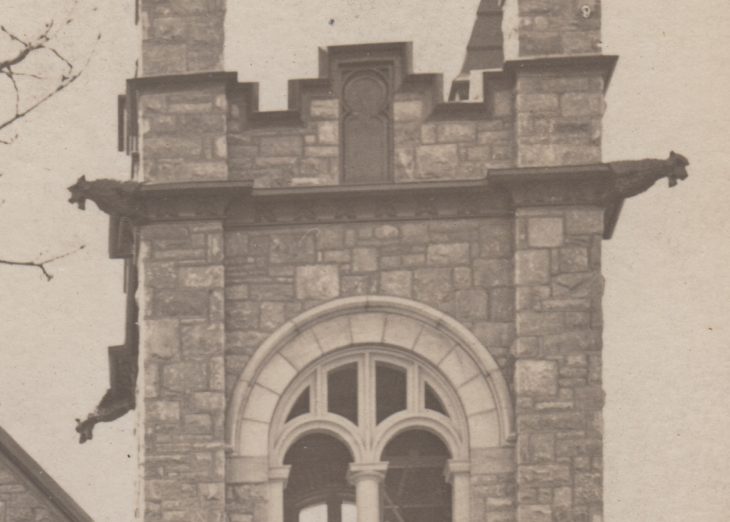
Word of the Day: Gargoyles
Today’s word of the day, courtesy of Merriam-Webster, is gargoyle. A gargoyle is “a strange or grotesque human or animal figure that sticks out from the roof of a building (such as a church) and is used to cause rainwater to flow away from the building’s sides” (https://www.merriam-webster.com/word-of-the-day). The website adds this:
In the 12th century, St. Bernard of Clairvaux reportedly complained about the new sculptures in the cloisters where he lived. “Surely,” he is quoted as saying, “if we do not blush for such absurdities we should at least regret what we have spent on them.” St. Bernard was apparently provoked by the grotesque figures designed to drain rainwater from buildings. By the 13th century, those figures were being called gargoyles, a name that came to Middle English from the Old French word gargoule. The stone beasts likely earned that name because of the water that gargled out of their throats and mouths; the word gargoule is imitative in origin.
Etymonline says something similar: “’grotesque carved waterspout,’ connected to the gutter of a building to throw down water clear of the wall, common in 13c.-16c. buildings; late 13c., gargoile, also garguile, gargule, etc., ‘carved mouth of a rain spout, a gargoyle,’ from Old French gargole, gargoule ‘throat;’ also ‘carved downspout,’ in the form of a serpent or some other fanciful shape, also from Medieval Latin gargola, gargulio (see gargle (v.)).
Now, I don’t know about you, but I’m genuinely surprised by this etymology. I expected that the word gargoyle would have had some origin in Old Germanic or Celtic monsters, like drude or nachzehrer or dearg du or kelpie. But instead its origin is imitative, imitating the sound the downspout makes when water comes out of its mouth. It makes you think that maybe the Disney series Gargoyles should have been sponsored by Listerine.
On this date in 1895, Oscar Wilde’s play An Ideal Husband premiered.
Oscar Fingal O’Flahertie Wills Wilde was born in Dublin, Ireland, in 1854, the child of Anglo-Irish intellectuals. His story is well known to most English majors, how he was sent to prison for allegedly engaging in homosexual activities, how he came out of prison impoverished and weakened, and how he died relatively young, at 46. Most of them also know that he was one of the wittiest writers in the history of the language. His most famous play is The Importance of Being Earnest, but he is also known for his novel The Picture of Dorian Gray. An Ideal Husband is less well known, but it may actually be more relevant to audiences today than the others, and, like most of Wilde’s work, it is full of wit.
An Ideal Husband was adapted into a movie in 1999, and here is Roger Ebert’s summary of the premise of the play: “The play tells the story of Sir Robert Chiltern, a rising parliamentary star who has been a paragon of honesty all of his career–except right at the first, when he shopped some secret government information to a baron, who paid him handsomely. Sir Robert is adored by his wife, whose high standards would not permit her to be married to a cheat and liar. An old acquaintance of theirs reappears in London: Mrs. Cheveley, who was once married to the baron, and possesses the letter in which Chiltern leaked the information. She blackmails him. Either he will change his position on an upcoming piece of legislation, thus protecting her investments, or she will reveal him as a fraud” (https://www.rogerebert.com/reviews/an-ideal-husband-1999). I’m going to stop there because I don’t want to spoil the story for you. What I do want to do is share some of the quotations from the play.
“Ah, I forgot, your husband is an exception. Mine is the general rule, and nothing ages a woman so rapidly as having married the general rule.”
“Even you are not rich enough, Sir Robert, to buy back your past. No man is.”
“My dear father, only people who look dull ever get into the House of Commons, and only people who are dull ever succeed there.”
“Morality is simply the attitude we adopt towards people whom we personally dislike.”
“I delight in talking politics. I talk them all day long. But I can’t bear listening to them.”
“Circumstances should never alter principles!”
“It is not the perfect, but the imperfect, who have need of love.”
And my favorite.
“My father told me to go to bed an hour ago. I don’t see why I shouldn’t give you the same advice. I always pass on good advice. It is the only thing to do with it. It is never of any use to oneself.”
I grew up in Bethlehem, PA. On Broad St. in Bethlehem is a church. It used to be Grace Lutheran Church, but I understand that it has been purchased by a Baptist church group. I remembered that it had gargoyles on it, but I couldn’t find a picture online. So I inquired of a group on FaceBook, and people actually sent me several good pictures of the tower of Grace Lutheran with the aforesaid gargoyles. Today’s image is of a 1906 postcard post by Nancy Rutman. Thank you, Nancy, but also thanks to Bruce McCandless and Keri Frey Owings, who also posted pictures, and the others in the You Know You’re from Bethlehem group who responded to my request.